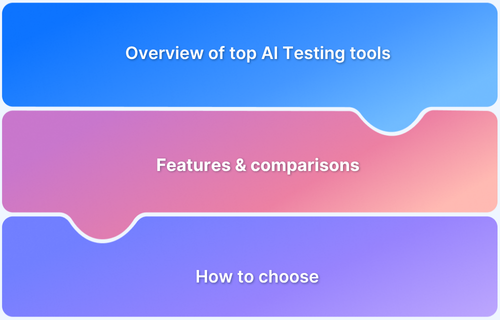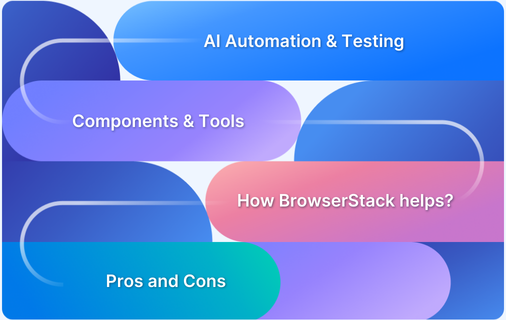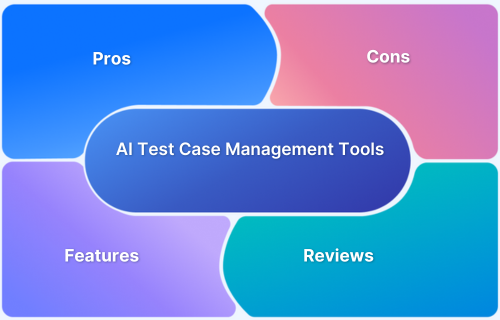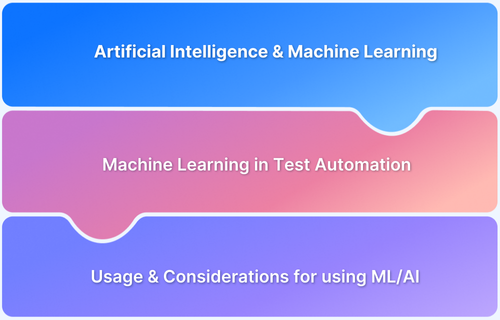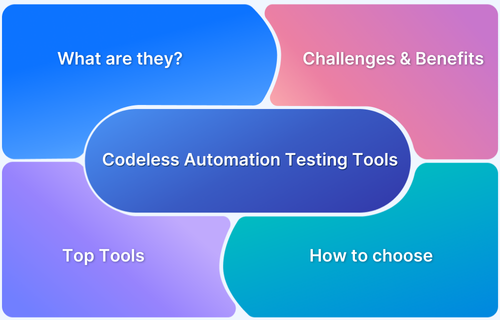Traditional test automation often struggles with high maintenance, flaky tests, and limited scalability. AI testing services address these challenges by generating smarter tests, adapting to changes, and improving reliability.
Overview
AI testing services use artificial intelligence to automate test creation, execution, and maintenance.
Best AI Testing Services
- BrowserStack: A cloud-based testing platform that uses AI agents for test generation, self-healing, accessibility checks, and visual validation on real devices.
- BugRaptors: A QA service provider leveraging AI and automation to optimize testing, predict defects, and improve overall software quality.
- DEKRA: A global safety and certification company applying AI-driven automation for compliance, performance, and functional testing.
- mabl: A cloud-native testing service with AI-powered auto-healing, visual change detection, and intelligent test creation for CI/CD pipelines.
- Qualitest: A large-scale QA provider that integrates AI for predictive analytics, automated test generation, and faster defect detection.
- QASource: A managed QA services company combining AI with automation frameworks to deliver end-to-end quality assurance.
- Testrig Technologies: A QA consulting and services firm using AI-enhanced testing to support functional, automation, and continuous testing needs.
- Webomates: A regression testing service powered by AI for self-healing, defect prediction, and optimized test execution.
- TestCraft: A codeless automation platform with AI-driven self-healing for Selenium-based functional and regression testing.
- Parasoft: An enterprise testing tool provider with AI capabilities for static analysis, automated unit testing, and test optimization.
This article explores how AI testing services are reshaping quality assurance, the best tools in the market.
What are AI Testing Services?
AI testing services are platforms and solutions that apply artificial intelligence to software testing. Instead of relying only on static scripts, these services use AI to generate test cases, adapt to application changes, analyze risk, and detect issues earlier in the development cycle.
By incorporating features like self-healing automation, predictive analytics, visual testing, and accessibility validation, AI testing services help QA teams reduce maintenance, increase coverage, and release high-quality software faster.
Best AI Testing Services
Here are some of the best AI testing services that bring intelligence, speed, and reliability to modern QA workflows.
BrowserStack
As a leading cloud testing platform, BrowserStack integrates AI-powered agents to transform how teams create, run, and maintain tests. It combines generative AI capabilities with specialized agents for test generation, self-healing, accessibility, and visual validation, all supported by 3500+ real devices and browsers. This makes it a complete solution for modern QA teams seeking scalability, accuracy, and speed.
Key Features:
- Test Case Generator Agent for automated test creation from requirements and user flows.
- Self-Healing Agent to adapt tests automatically when UI elements or workflows change.
- Low-Code Authoring Agent for building and editing tests with minimal coding.
- A11y Issue Detection Agent for early accessibility checks and WCAG compliance.
- Visual Review Agent to highlight meaningful UI changes while filtering out noise.
Pros:
- End-to-end coverage across functional, regression, accessibility, and visual testing.
- Accelerates test creation while reducing flaky test failures and maintenance.
- Seamless scalability across real devices and browsers in the cloud.
BugRaptors
A global QA and software testing company, BugRaptors offers managed QA services powered by AI and automation. Their approach emphasizes predictive defect detection, risk-based prioritization, and optimized coverage across multiple domains. By combining AI frameworks with domain expertise, they help enterprises improve release quality and reduce testing costs.
Features:
- AI-powered test automation frameworks
- Predictive defect analytics and risk-based testing
- Cross-domain QA expertise
- Managed and consulting QA services
Pros:
- Strong domain specialization in regulated industries
- Scalable managed QA delivery
- Predictive insights improve test focus
Cons:
- Service-only model, no proprietary tool
- Can be costly for startups
- Delivery quality may vary by project scope
DEKRA
Well known for certification and safety, DEKRA also applies AI in its software testing services. It focuses on compliance, performance, and functional QA for industries like automotive, IoT, and industrial systems. AI-enabled automation helps ensure safety standards while speeding up validation for mission-critical systems.
Features:
- AI-driven compliance and certification QA
- Performance and functional testing
- Domain expertise in automotive, IoT, and safety-critical systems
- Global certification integration
Pros:
- Trusted global brand in safety and compliance
- Excellent for regulated and high-risk industries
- Broad service portfolio beyond QA
Cons:
- Less focused on mainstream web/mobile automation
- Best suited for enterprise-level projects
- Limited flexibility for small or mid-sized teams
mabl
As a cloud-based AI testing platform, mabl emphasizes continuous testing in CI/CD pipelines. It provides auto-healing tests, visual change detection, and intelligent test creation, making it a strong fit for agile teams. Its AI models adapt test scripts automatically, reducing flaky tests and maintenance costs.
Features:
- Auto-healing UI and API tests
- Visual validation with change detection
- Seamless CI/CD integration
- Intelligent test generation
Pros:
- Easy adoption for agile and DevOps teams
- Reduces test flakiness with self-healing
- Excellent integration with CI/CD tools
Cons:
- Less customization for complex apps
- Premium pricing tiers
- Smaller ecosystem vs. legacy enterprise players
Qualitest
A global QA services provider, Qualitest leverages AI to deliver predictive defect analytics, test automation, and domain-specific solutions. Its offerings cover functional, regression, and performance testing tailored to industries like finance, healthcare, and retail. The company’s AI focus lies in risk-based testing and optimization.
Features:
- AI-powered predictive analytics
- Automated functional and regression testing
- Industry-specific QA expertise
- Managed QA services at scale
Pros:
- Deep domain knowledge across verticals
- Scalable global delivery
- Predictive insights for smarter testing
Cons:
- Expensive compared to smaller providers
- Services may feel generalized for startups
- Tool innovation less than platform-first vendors
QASource
As a managed QA service provider, QASource blends AI with automation frameworks to deliver functional, performance, security, and API testing. The company offers flexible engagement models, including offshore, onshore, and hybrid teams. AI tools are used to optimize test cases and improve coverage across projects.
Features:
- AI-enhanced automation frameworks
- End-to-end managed QA services
- Functional, performance, and security testing
- Offshore/onshore delivery models
Pros:
- Cost-effective managed QA
- Flexible engagement options
- Balanced manual + automated QA expertise
Cons:
- Limited focus on accessibility and visual AI
- Quality may vary by delivery team
- More service-driven than product-driven
Testrig Technologies
A QA consulting and services company, Testrig integrates AI-assisted automation to support agile and continuous testing. Its focus lies in functional, performance, and mobile testing with consulting support for enterprises. AI enhances test design and execution speed, enabling faster time-to-market.
Features:
- AI-powered automation support
- Agile and DevOps-focused QA
- Functional, performance, and mobile testing
- Consulting and managed services
Pros:
- Tailored solutions for enterprises
- Strong alignment with agile delivery
- Competitive pricing models
Cons:
- Service-focused, lacks proprietary platform
- Smaller scale than global providers
- Limited innovation in AI vs. tool-first vendors
Webomates
A cloud-based regression testing service, Webomates uses AI to provide self-healing test cases and predictive defect detection. The platform focuses on continuous regression coverage, ensuring stable releases in agile environments. By automating updates to test suites, it helps reduce repetitive manual effort.
Features:
- AI-powered regression automation
- Self-healing test cases
- Predictive defect detection
- Cloud execution for scalability
Pros:
- Excellent regression testing optimization
- Supports continuous testing for agile teams
- Predictive insights improve release quality
Cons:
- Primarily regression-focused
- Less suitable for full-spectrum testing
- Limited flexibility for customization
TestCraft
Built on Selenium, TestCraft is a codeless automation platform that integrates AI for self-healing. It allows teams to create functional and regression tests quickly, while AI minimizes the effort needed for test maintenance. It’s best suited for web app testing with visual authoring.
Features:
- Codeless Selenium-based test authoring
- AI-powered self-healing automation
- Visual test editor
- CI/CD compatibility
Pros:
- Reduces coding dependency for QA teams
- Lower maintenance costs with self-healing
- Fast test creation for functional coverage
Cons:
- Limited customization for complex testing
- Focused mainly on web testing
- Smaller community than Selenium/WebDriver
Parasoft
A mature enterprise testing vendor, Parasoft embeds AI into static code analysis, automated unit testing, and compliance validation. It focuses on early defect detection and reliability for mission-critical and regulated industries like automotive, aerospace, and healthcare.
Features:
- AI-assisted static code analysis
- Automated unit and functional testing
- Service virtualization and API testing
- Compliance and safety validation
Pros:
- Excellent fit for regulated, enterprise domains
- Detects issues early in the SDLC
- Robust support for API and service testing
Cons:
- Steep learning curve for new teams
- Expensive for smaller organizations
- Focused mainly on enterprise-grade workflows
Factors to Consider when Choosing AI Testing Services
Selecting the right AI testing service depends on your team’s goals, workflows, and application complexity. Here are the key factors to evaluate:
- Scope of Testing Needs: Identify whether you need functional, regression, performance, security, visual, or accessibility testing, and ensure the service covers those areas.
- AI Capabilities: Look for core AI features like self-healing, intelligent test generation, predictive analytics, visual validation, and accessibility checks.
- Ease of Adoption: Consider if the service offers codeless or low-code options, natural language test creation, and smooth onboarding for non-technical users.
- Integration with CI/CD: Ensure compatibility with your existing pipelines, version control systems, and DevOps workflows.
- Scalability: Check if the service can execute tests across multiple browsers, devices, and environments in parallel.
- Domain Expertise: For industries like healthcare, finance, or automotive, domain-specific compliance and regulatory support are critical.
- Cost and Flexibility: Balance pricing with feature depth-some services are tool-first while others are managed QA providers. Choose one that aligns with your budget and ownership preference.
- Support and Ecosystem: Strong documentation, responsive support, and a vibrant user community can significantly impact long-term success.
By weighing these factors, teams can choose an AI testing service that not only reduces maintenance and improves coverage but also fits seamlessly into their development cycle.
Why Choose BrowserStack?
BrowserStack brings AI-powered testing into every stage of the QA lifecycle through specialized AI agents. These agents help teams accelerate test creation, reduce flaky failures, and optimize execution, all on BrowserStack’s secure, scalable cloud infrastructure with 20,000+ real devices and browsers.
AI Agents in BrowserStack:
- Test Case Generator Agent: Automatically creates test cases from requirements or user flows, cutting test design time.
- Self-Healing Agent: Detects UI or workflow changes and updates tests instantly to prevent failures.
- Low-Code Authoring Agent: Empowers both technical and non-technical users to build and edit tests with minimal coding.
- Test Selection Agent: Identifies the most relevant test cases to run for a given code change, accelerating regression cycles.
- Test Deduplication Agent: Removes duplicate or redundant tests, keeping test suites lean and efficient.
- A11y Issue Detection Agent: Flags accessibility issues early to help teams meet WCAG standards and deliver inclusive apps.
- Visual Review Agent: Highlights only meaningful UI changes while filtering out pixel-level noise, making visual testing clearer and faster.
BrowserStack delivers end-to-end AI coverage across functional, regression, accessibility, and visual testing, enabling teams to streamline quality assurance across the entire lifecycle. Its intelligent capabilities accelerate test creation while minimizing maintenance through self-healing and optimization, ensuring more stable and reliable automation.
Built on enterprise-grade infrastructure, the platform offers the scalability and security needed to support teams of all sizes, and is trusted by organizations worldwide to deliver software with speed and confidence.
Conclusion
AI testing services are transforming the way software is validated, moving beyond static automation to intelligent, adaptive, and efficient QA practices. From self-healing automation and predictive defect detection to visual validation and synthetic data generation, these services help teams deliver faster, more reliable releases.
Among the wide range of providers, BrowserStack stands out with its combination of Generative AI capabilities and specialized AI agents that cover functional, regression, accessibility, and visual testing. For organizations looking to future-proof their QA strategy, embracing AI-powered testing services ensures not only higher software quality but also the speed and scalability needed in today’s competitive digital landscape.



